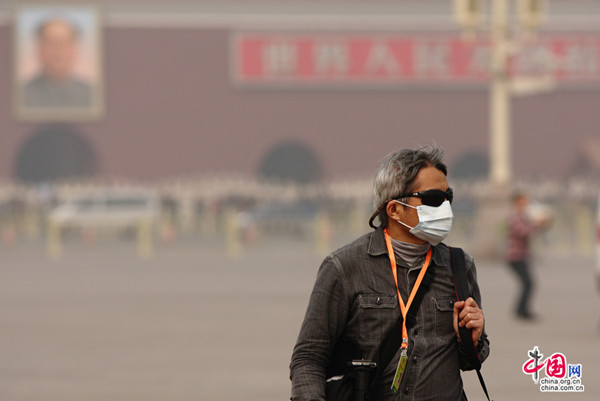People's wellbeing comes first in air pollution battle
- By Gong Yingchun
 0 Comment(s)
0 Comment(s) Print
Print E-mail China.org.cn, November 13, 2013
E-mail China.org.cn, November 13, 2013
Xie Dianjun, a parking warden, works near the General Hospital of Chinese People's Armed Police Forces in Haidian District in Beijing. He stays outdoors for at least 15 hours every day. Xie sometimes puts both hands over his mouth when he has to take a deep breath during the working hours. "I have to breathe in large amounts of car emissions every day. I always have an uncomfortable, strange feeling in my throat on smoggy days," he said.
|
 |
|
A resident wearing a mask and sunglasses walks in Beijing, as heavy smog hit the city. [Photo/China.org.cn]? |
Xie is one of 600 million people in China who have been choking on hazardous smog since the beginning of 2013.
An area in China covering almost 1.3 million square kilometers was engulfed in dense smog this January. Last month, cities in northeast China were also blanketed with severe smog. In Harbin, schools and airports were forced to close, traffic ground to a halt, and the PM2.5 measurement reached 1,000 micrograms per cubic meter in parts of the city, 40 times the safe level determined by the World Health Organization.
Lingering hazardous smog has aroused concerns over China's air pollution and its efficiency in dealing with it.
China's efforts to curb air pollution
At a press conference in March, Premier Li Keqiang vowed to deal with pollution, saying that "we will upgrade the country's economic development model so people can enjoy clean air, and safe drinking water and food… We need to enforce the law with an iron fist."
China's State Council released its new Action Plan for Air Pollution Prevention and Control (2013-17) (Action Plan) in September, claiming that China will improve its air quality over the next five years. The policy is the toughest ever, and has set out a road map for air pollution and control with a focus on three key regions: the Beijing-Tianjin-Hebei regional cluster (Jing-Jin-Ji), the Yangtze River Delta (YRD) and the Pearl River Delta (PRD). It is composed of ten measures and 35 sub-sections.
Xie Zhenhua, vice chairman of National Development and Reform Commission (NDRC), said at a press conference that China's extensive model of economic development, and irrational industrial and energy structure has led to its serious air pollution. "The main cause, however, is massive consumption of fossil fuels," Xie said. He said that China should transform its development modes and speed up the restructuring process.
China has made great efforts to optimize its energy structure by promoting the clean use of fossil fuels and developing non-fossil fuels. By the end of 2012, the one-time energy consumption of standard coal equivalent was 3.62 billion tons, of which the coal accounted for 67.1 percent, dropping 1.3 percent compared with 2011; oil and natural gas was 18.9 percent and 5.5 percent, up 0.3 percent and 0.5 percent from the previous year; and non-fossil fuels made 9.1 percent, up 1.1 percent compared with 2011, according to an annual report, entitled China's Policies and Actions for Addressing Climate Change (2013), which was issued in November.
The people's wellbeing comes first
Chinese President Xi Jinping pledged that China will not sacrifice the environment for temporary economic growth, at a study session on promoting ecological progress with members of the Political Bureau of the Communist Party of China (CPC) Central Committee in May.
Xi proposed that China should balance economic development and environmental protection carefully. It must be determined to curb environmental pollution, build a sound ecosystem, and work to usher in a new era of socialist ecological progress.
At a personnel work meeting just before the 92nd anniversary of founding of the Communist Party of China (CPC) in June, Xi also said that China should consider the achievements of local officials from various aspects, including the people's livelihoods, the development of the local society and environmental quality. "We should never judge a cadre simply on gross domestic product (GDP)," he said.
China has overtaken Japan as world's second largest economy, and it ranked 89th out of 200 countries in the world in terms of GDP per capita. "The demand for clothing and food is no longer China's main concern. Its people's happiness has become the most important," said Li Junfeng, head of the National Center for Climate Change Strategy and International Cooperation (NCSC).
Former Chinese president Hu Jintao's report at the 18th CPC National Congress emphasized importance of people's happiness. He said, "we must give high priority to ensuring and improving the people's wellbeing."
Xi Jinping said at the closing meeting of the 12th National People's Congress that to achieve the Chinese Dream of the great rejuvenation of the Chinese nation is to achieve national prosperity, revitalization and the people's wellbeing.
The International Agency for Research on Cancer (IARC), the specialized cancer agency of the World Health Organization, announced in October that there is sufficient evidence that exposure to outdoor air pollution causes lung cancer. Moreover, Beijing municipal health authorities said last Friday that the number of lung cancer patients in the city has been rising over the last decade.
China has released the Air Pollution Prevention and Control Law, which specifies standards for various air pollutants emissions. "Our environmental quality has not been significantly improved although we have achieved all the targets specified in the law," Li said.
"I hope that the people's health can be considered as an assessment index and enshrined in China's law in the future," Li said.
Following China's emphasis on the people's happiness in the battle for clean air, we can expect more practical actions to guarantee the people's wellbeing in the future.





